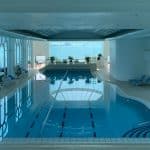Gone are the days of stuffy, hot, and overly humid indoor pool areas. The modern solution to this age-old problem is the dehumidifier, a device that can regulate the levels of moisture in the air and create a more comfortable environment for swimmers. But what is it about dehumidifiers that make them such a valuable asset to indoor pools in the UK, and how do they work? Let’s unpack these questions and more in this comprehensive guide.
Optimising Comfort and Health
Dehumidifiers have a direct impact on the comfort and health of those who use indoor swimming pools. Whenever you heat water, it tends to evaporate and increase the humidity level in the air. This can make an indoor pool area uncomfortable and stifling, and it can also have negative health effects.
A lire en complément : How do you manage and maintain pH levels in a heavily shaded UK home swimming pool?
High indoor humidity can exacerbate respiratory problems and allergies. It can also encourage the growth of mould, mildew, and other fungi, which can lead to further health issues. A dehumidifier can control the level of moisture in the air, reducing the likelihood of these problems occurring.
Moreover, dehumidifiers can help to maintain a consistent temperature in the pool area. High humidity can make the environment feel hotter than it actually is, and controlling the moisture in the air can help to keep the temperature steady. This is especially important in an indoor pool, where the heat generated by the water needs to be managed efficiently.
A lire aussi : The best baby pool floats for safe summer splashing
Prolonging the Lifespan of Your Pool and Its Surroundings
The high level of moisture in an indoor swimming pool area can have detrimental effects on the physical structure of the building. This is because water, and particularly warm, humid air, can cause damage to a variety of materials over time.
The constant presence of moisture can lead to the deterioration of walls, ceilings, and fixtures. It can cause paint to peel, wood to warp, and metals to corrode. By using a dehumidifier to control the level of moisture in the air, you can help to prevent these problems and prolong the lifespan of your pool and its surroundings.
Additionally, a dehumidifier can help to protect any electronic equipment in the pool area. High humidity can cause damage to electrical systems, which can be costly to repair or replace. By maintaining a lower level of moisture in the air, a dehumidifier can help to protect these systems and reduce the risk of electrical faults or failures.
Energy Efficiency and Heat Recovery
Modern dehumidifiers are not only effective at controlling humidity, but they can also be incredibly energy efficient. Many units utilise heat recovery systems, which can capture and reuse the heat generated during the dehumidification process.
This process involves the dehumidifier absorbing the moist, warm air from the pool area and passing it over a cold coil. The moisture in the air condenses on the coil and is collected as water, while the remaining dry air is heated and returned to the room. This means that the dehumidifier can contribute to heating the pool area, reducing the need for additional heating systems and saving energy.
There are even solar-powered dehumidifiers available, which can further increase energy efficiency and reduce the environmental impact of maintaining an indoor pool.
Improved Water Evaporation Control
Lastly, a dehumidifier can help to control the rate of water evaporation from your pool. In a high-humidity environment, the water in your pool will evaporate more quickly. This can lead to increased water usage and costs, as the pool will need to be refilled more often.
By using a dehumidifier to maintain a lower humidity level, the rate of evaporation can be reduced. This can extend the time between refills, saving water and reducing costs. It can also help to maintain a more consistent water level in the pool, which can improve the swimming experience.
In conclusion, the benefits of using a dehumidifier in an indoor UK pool area are clear. Not only can they help to maintain a comfortable and healthy environment for swimmers, but they can also protect the physical structure of the building, increase energy efficiency, and control water evaporation. So if you’re looking to improve your indoor pool, a dehumidifier might be just what you need.
Lowering Energy Consumption with Pool Dehumidifiers
Swimming pools, especially those located indoors, often require a significant amount of energy to maintain. Heating the pool water, powering the pumps, and managing the indoor air quality can all add up to a substantial energy bill. Fortunately, a pool dehumidifier can play a crucial role in reducing energy consumption and lowering these costs.
A dehumidifier works by drawing in moist air, removing the excess moisture, and then expelling the drier air back into the room. Notably, some pool dehumidifiers are equipped with heat pump technology, which can help heat the area efficiently. Heat pumps work by absorbing the heat from the air during the dehumidification process and using it to warm the pool water or the surrounding air. This process significantly reduces the need for separate water heating and air conditioning systems, leading to energy savings.
On top of the energy-saving heat pump technology, many dehumidifiers also feature energy-efficient designs. Some models have energy-saving modes, automatic shut-off features, and even smart technology that allows them to adjust their operation based on the room’s relative humidity levels.
Moreover, wall-mounted dehumidifiers are becoming increasingly popular in the UK. They are a space-saving option that can be installed out of the way, and many models are designed to operate quietly, making them an unobtrusive addition to your indoor pool area.
Conclusion: The Essential Addition to Indoor Swimming Pools
To recap, the use of a dehumidifier in an indoor UK pool area presents a multitude of benefits. These devices play a pivotal role in optimising comfort and health by controlling humidity levels, which can help alleviate respiratory problems, inhibit the growth of fungi, and maintain a consistent temperature in the pool area.
Further, they contribute to the longevity of your pool and its surroundings. They prevent the deterioration of walls, ceilings, and fixtures caused by high humidity, and protect electronic equipment from moisture-related damage.
Moreover, dehumidifiers, especially those equipped with heat pumps, can significantly lower energy consumption by efficiently heating the pool water and the surrounding air. They also contribute to improved water evaporation control, reducing water usage, and related costs.
From protecting swimmers’ health to preserving the building’s physical structure, to energy saving and water evaporation control – a pool dehumidifier is a smart investment for any indoor swimming pool owner in the UK. With the variety of models available today, including wall-mounted and solar-powered units, there’s certainly a dehumidifier out there that will perfectly suit your needs.










